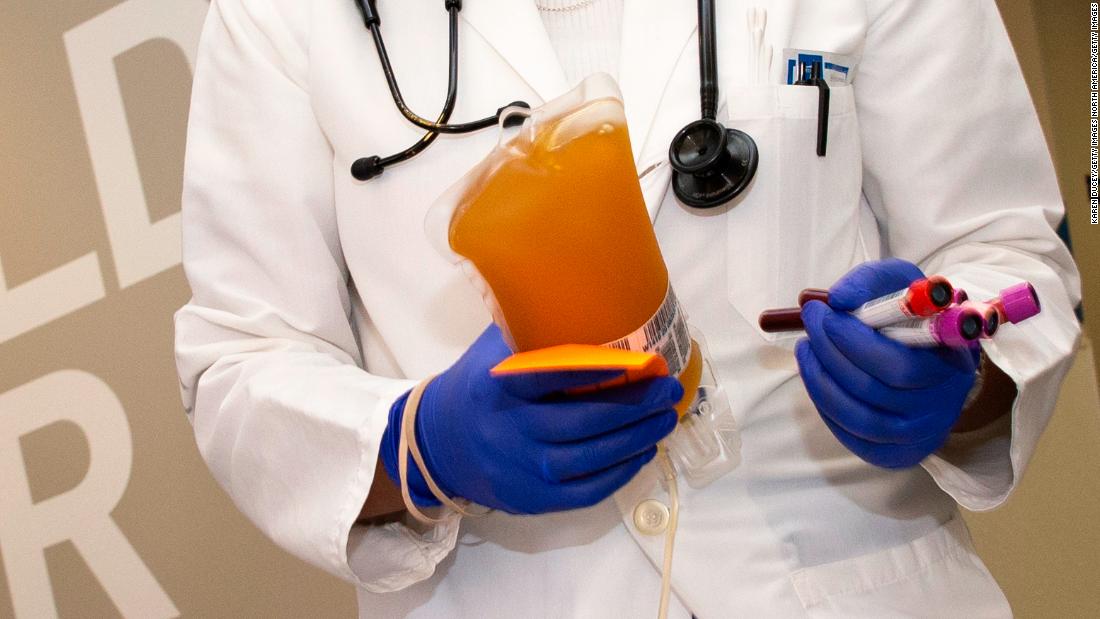How does convalescent plasma treatment work?
1:38
(CNN Spanish) -
Using convalescent plasma as therapy to treat hospitalized patients with coronavirus is a method that has been used since the beginning of the pandemic.
At that time, scientists said that the antibodies present in this plasma - which is extracted from people who have overcome the disease - helped reduce mortality in critically ill patients.
However, a study published in the journal BMJ shows that the use of convalescent plasma does not prevent the complication of symptoms in patients with covid-19.
You can listen to this episode on Apple Podcasts, Spotify, or your favorite podcast platform, or read the transcript below.
Hello, I am Dr. Elmer Huerta and this is your daily dose of information about the new coronavirus.
Information that we hope will be useful to take care of your health and that of your family.
advertising
Today we will see a study that shows that convalescent plasma, rich in antibodies, does not reduce the mortality of hospitalized patients with covid-19.
Basics of convalescent plasma treatment
As we described in the April 7 episode, convalescent plasma treatment is based on the fact that the blood of a person recovering from the disease contains an enormous amount of specific antibodies against the new coronavirus.
Knowing that, the blood of a donor who has overcome the disease is processed, separating the solid or cellular part (which contains white, red blood cells and platelets), from the liquid part or plasma of the blood.
That plasma, rich in antibodies, is then transfused to the patient in the hope that the convalescent's antibodies will neutralize the virus that is attacking him.
This type of treatment, also called passive immunization (to differentiate it from the active immunization that is the vaccine), has been used since the 19th century.
The historical use of plasma as a treatment
In 1890, for example, it was used to combat diphtheria.
In 1918, to treat the great flu pandemic.
In the forties, for the whooping cough.
In the seventies, for the treatment of tetanus.
And, in this century, to treat SARS, MERS, H1N1 flu and Ebola.
Unfortunately, as we saw in the August 31 episode, the effectiveness of this type of treatment has not been scientifically proven.
After being approved for emergency use by the FDA [US Food and Drug Administration] in April, convalescent plasma was widely used by physicians in many parts of the world.
In the United States, for example, a network of 2,700 hospitals that administered it was formed, creating the perception among patients and their families that plasma was the most effective treatment to cure the disease and, therefore, they refused to participate in studies clinical trials aimed at testing whether it really worked or not.
In other words, the massive use of a scientifically unproven treatment had a counterproductive effect: it made its scientific evaluation difficult.
To prove that plasma treatment really works, studies need to be done in which half the patients are given plasma and the other half a placebo.
But understandably, since patients were convinced that plasma was effective, it was difficult to convince them to participate in a study that bypasses them to receive a placebo.
What do scientists say?
Well now, an article published in the medical journal BMJ describes a study done in India, in which a group of 464 adults with moderate covid-19 from 39 hospitals were randomly drawn to receive plasma or to continue with medical care. standard, without plasma.
In total, 235 patients received convalescent plasma along with standard care for treatment and 229 patients received only standard care.
Regarding the symptoms of the disease, the results showed that, despite the fact that a higher proportion of patients who received convalescent plasma improved their symptoms of fatigue and shortness of breath, there was no difference in the relief of fever and cough.
On the other hand - and these were the most important results that were expected - neither the proportion of patients who worsened nor the proportion of patients who died was lower in the group that used convalescent plasma.
In other words, convalescent plasma did not prevent patients from reaching intensive care or save their lives.
The results of the study
In this regard, 44 patients or 19% of participants in the group that received plasma and 41 or 18% of patients who did not receive it degenerated into a more serious disease or died for any reason within 28 days after starting treatment.
The authors conclude that their study can be generalized to many other countries that have approved convalescent plasma without having a scientific basis to do so, especially in low- or middle-income countries that do not have all the safety measures that this type of treatment requires. .
Transfusing plasma prepared under unsanitary conditions or without adequate control of viruses or bacteria can cause more harm than good in patients affected by covid-19.
Other experts are more cautious and ask to wait for studies with a larger number and selection of participants, before abandoning this type of treatment.
Do you have questions about the coronavirus?
Send me your questions on Twitter, we will try to answer them in our next episodes.
You can find me at @DrHuerta.
If you think this podcast is helpful, help others find it by rating and reviewing it on your favorite podcast app.
We will be back tomorrow so be sure to subscribe to get the latest episode on your account.
And for the most up-to-date information, you can always head to CNNEspanol.com.
Thanks for your attention.
If you have any questions you can send them to Dr. Elmer Huerta via Twitter. You can also head over to CNNE.com/coronaviruspodcast for all episodes of our “Coronavirus: Reality vs. Reality” podcast. fiction".
coronaviruscovid-19 convalescent plasma

